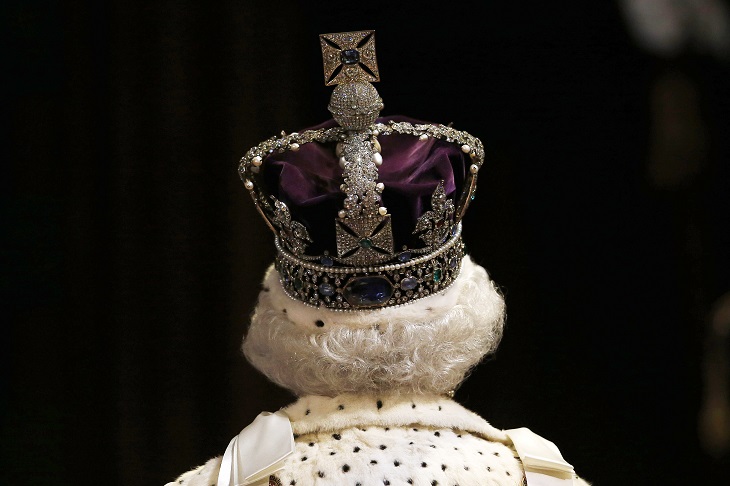Greens Senator Lidia Thorpe entered the Parliament’s Senate chamber with a black power salute and proceeded to disrespect the oath she was obliged to recite before being allowed to take her seat.
‘I will be faithful and I bear true allegiance to the colonising Her Majesty Queen Elizabeth the Second,’ she said, in a mocking tone, before being told by the President of the Senate, Sue Lines, that she must recite the oath as printed on the card.
After reciting the oath correctly, Senator Thorpe tweeted: ‘Sovereignty never ceded.’ It was a rather silly statement to make given her protest against ‘the colonising’ Queen Elizabeth II.
Sovereignty never ceded. https://t.co/OowLrlUApy
— Senator Lidia Thorpe (@SenatorThorpe) August 1, 2022
The legal notion of sovereignty is quite recent.
It was coined by Jean Bodin and defined by the English philosopher Thomas Hobbes in the 17th century from the word ‘sovereign’ which is, by definition, an absolute monarch who held complete control of the making and enforcement of laws.
In the context of Australia’s liberal democracy, sovereignty is the authority of all the Australian people to make and amend the laws, a concept unknown to our Indigenous brethren until Governor Phillip’s arrival. It could even be said that Phillip introduced Indigenous Australians to the concept of sovereignty.
Senator Thorpe has a very narrow opinion about Australia, which seems to align with inner-city activists in Melbourne. Her opinion implies that Indigenous lives were brutalised by settlers after colonisation and, since Federation, by those constitutionally responsible for Indigenous welfare.
She is absolutely correct. The plight of Indigenous Australians at our hands, many of whom signed up to fight our enemies in previous world wars, is a moral blot on Australia’s history. In that regard, Thorpe has good reason to protest; except, her rush to blame our Constitution or the Commonwealth instead of the human beings who allowed the poor behaviour to happen, is not only unprofitable, but wrong.
The problem for Senator Thorpe is that she is now in a position to actually achieve some progress in rectifying that situation, to substitute action for activism. In this respect, her protest was an ill-chosen, irrelevant distraction.
The purpose of this article is to put Senator Thorpe’s opinions about our Constitution into a different perspective and to assist in the understanding of the Constitution’s virtues. It may be the case that Thorpe’s perspective on our Commonwealth is probably no different from 99 per cent of the Australian population who enjoy the benefits that its civilising powers bring to the national table, but are unaware of how or why those benefits accrue.
It would be useful to know if Thorpe’s black power salute was a statement of her identity as an Indigenous person, or a symbolic acknowledgment of the division between black and white in Australia. However, given her references to the monarch as a coloniser, which is incorrect for two reasons, it was probably the latter.
Still, the inaccuracy of constitutional statements and symbols is not unique to Senator Thorpe. Reflect for a moment on the political scheme advanced by the Australian Republican Movement (ARM) and you will realise the claim that removing the monarch will turn Australia into a republic was only ever an ego trip or bucket list for the elite rather, than a display of knowledge regarding either our Constitution or a republican government.
From another perspective, the claim that a Governor-General has sovereign powers to dismiss an elected government and rescue Australia from democracy has to be the height of fantasy. Bearing in mind that the Governor-General is commander in chief of the armed forces, a sensible man wouldn’t be surprised if the rescue mission resulted in, ‘bugger democracy’ for at least a few decades.
Examples that prove the importance of education would not be complete without the mention of Australia’s High Court madness that deemed Mr Love, a man born in Papua New Guinea, to be an Australian citizen and Indigenous on the basis of his feelings, despite the Commonwealth Parliament’s Australian Citizenship Act.
There is much more to our Constitution than powers, processes, and institutions. It is based on solemn principles of the equality of all men and their entitlement to certain fundamental political rights. Nevertheless, I doubt whether more than a handful of our countrymen have reflected on the meaning of those principles let alone which level of government has responsibility under the Constitution for health, education, and quarantine or, indeed, for Aboriginal health and education.
The virtues of our Constitution and its inherent principles are not taught to our children in any civics course and what passes for political science in universities is a misnomer. How then can we be critical of Senator Thorpe when her opinions reflect her experience of our Constitution, but only as it is understood by those who misrepresent its political purpose?
Senators would do well to engage in a civics education program. To do that, they may want to begin by reading the debates of the 1897-98 Constitutional Convention. They are freely available to download at the Parliamentary Information website. With knowledge of the Constitution as seen through the eyes of our founding fathers, Senators will better understand the extent and direction of their duties and how the Commonwealth’s powers can advance the interests of Indigenous Australians by educating Indigenous children.
Senator Thorpe is now in a position to do good things for them and to hold the government accountable when it abandons Aboriginal families to substitute ideological platitudes that deliver kudos, power, and money to inner-city elites.
If she puts aside her activism while gathering that knowledge, and identifies those few things that can be done well from Canberra, she may well discover that she will win a good name for eternity from those in the remote Aboriginal communities for whom life at the moment is nasty, brutish, and short.
Got something to add? Join the discussion and comment below.
Get 10 issues for just $10
Subscribe to The Spectator Australia today for the next 10 magazine issues, plus full online access, for just $10.

























Comments
Don't miss out
Join the conversation with other Spectator Australia readers. Subscribe to leave a comment.
SUBSCRIBEAlready a subscriber? Log in